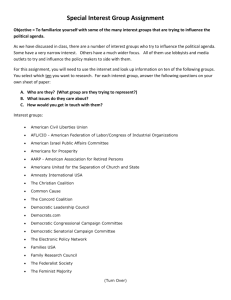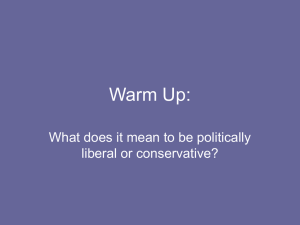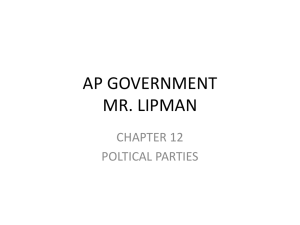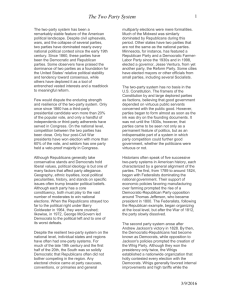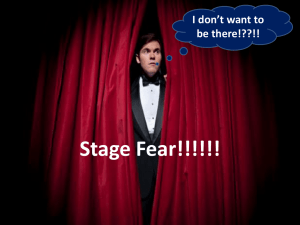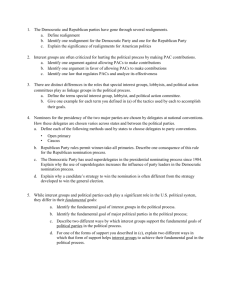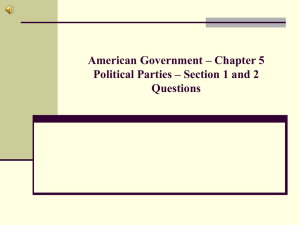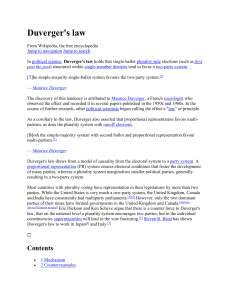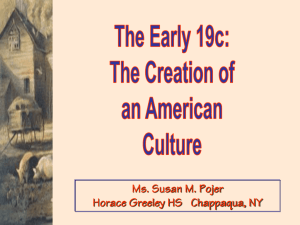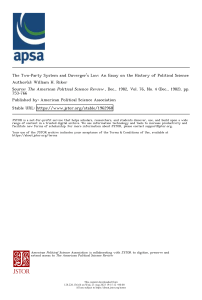Political Parties
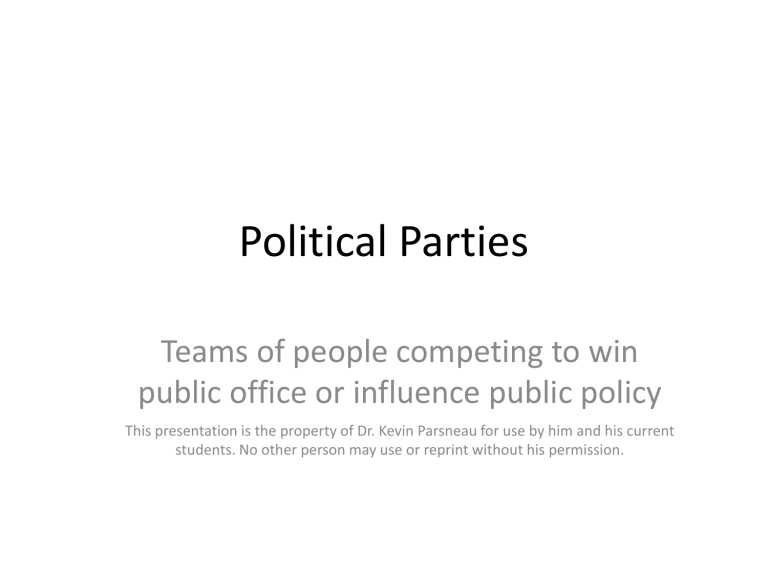
Political Parties
Teams of people competing to win public office or influence public policy
This presentation is the property of Dr. Kevin Parsneau for use by him and his current students. No other person may use or reprint without his permission.
• Are political parties “factions” or mechanisms for unity and action?
• What is a political party and why do we have them?
• How do parties work in the ideal world?
• Why does the U.S. have a two-party system?
• What role do third parties have in the U.S. system?
Political Parties
• Definition(s): a team of people seeking to win office or influence public policy through elections (not to be confused with revolutionary parties that may not use elections or seek to gain office).
Three Aspects of Parties
• Political Parties
– Party in organization
– Party in the electorate
– Party in government
• These can be seen as ways to look at parties or parts of the parties
Party in Organization
• “Party in Organization”--party "professionals" who run the day-to-day tasks of the party as well as those who hold official offices within the party
– National Committees
– Campaign Committees
– National Conventions
– State and local parties
Some Important Party Groups
• Democratic National Committee
• D.N.C. Chair and Members
• Democratic Senatorial Campaign Committee
• Democratic Congressional Campaign Committee
• Republican National Committee
• R.N.C. Chair and Members
• National Republican Congressional Committee
• National Republican Senatorial Committee
Party Platforms
• Formal statements of the party’s official principles, beliefs and position on policies and issues.
• Drafted and approved at national conventions
• Can be used to pressure party’s officeholders to uphold the ideals of party delegates
Party in the Electorate
• Party in the Electorate--people who identify themselves with the party or register as a member of the party
Party in the Electorate
• Ideological Parties: parties whose members generally share a single ideology even though they may differ on some specific issues.
• Coalition Parties: parties whose members have a relatively diverse set of beliefs or important issues but usually agree enough to act as a team to elect their candidates.
Party in Government
• Party in Government--officeholders at any level who affiliate with a political party
Why do we have parties?
• Party Labels
• Electoral Coordination
• Legislative Coordination
• Laws and Rules
• Voter Mobilization
How do parties work in the ideal world?
• Responsible Party Government: the theory that political parties are necessary and good for democracy because they are the means for voters to hold government accountable. It argues that parties advocate clearly different policies, and they try to promote successful policies because voters will reward or punish them based upon their performance in office.
Problems w/ RPG
• Rarity of unified government
• Parties don’t articulate clear policy choices
• Candidates win based on individual appeal and fundraising independent of parties
• No strong enforcement mechanisms to make them stick to the platform
• Checks and balances and assigning credit/blame
• Federalism and assigning credit/blame
Why does the U.S. have only two parties?
• Natural
• Ballot access
• Coopting
• Duverger's Law
Duverger’s Law
• Duverger’s Law: Single-member, winnertakes-all districts discourage third parties by squeezing out any party is not a viable threat to win a plurality in the election.
Third Parties
Famous Third Parties
• Populist Party—1892 William Jennings Bryant
• Progressive Party—1912 Theodore Roosevelt
• Socialist Party—1900 Eugene Debs
• American Indep. Party—1968 George Wallace
• Libertarian Party—1971
• Green Party—1984 Ralph Nader
• Reform Party—1995 H. Ross Perot
Third Parties
Types of Third Parties
• Fracture Parties
• Ideological Parties
• Personality Parties
• Single Issue Parties
Third Parties
Strategies of Third Parties
• Displace a major party
• Pressure major parties
• Suggest a new way
• Raise important issues
• Register a protest vote
Some thoughts
• Political parties may have a invidious effect
• Democracies seem unthinkable except in terms of political parties
• Parties are elected officials, party workers and supporters among the public.
• Parties work in an ideal, but we do not match the ideal
• The U.S has a two-party system
• Conscious choice by parties
• Institutional arrangements and Duverger’s Law
• Third Parties have a role
